Un double boot Windows/Linux et une AppImage serait bien mieux.
2,926 2020-08-20 20:40:38
Re: Lenteur et plantage sous windows 8.1 (24 replies, posted in FR : Aide, suggestions, discussions, ...)
2,927 2020-08-20 20:08:30
Re: How can i build in Windows QTcreator : KwidgetAddons KcoreAddons (24 replies, posted in Code)
It 's packaging work.
You build in shared mode also you need to learn windeployqt to find DLL's to put in bin folder with .exe binary.
https://doc.qt.io/qt-5/windows-deployment.html
http://renaudguezennec.eu/index.php/201 … cation-qt/
2,928 2020-08-20 14:22:04
Re: Transformation Matrix for Element Editor (15 replies, posted in Code)
Hmm, firefox?
2,929 2020-08-20 13:05:24
Re: Transformation Matrix for Element Editor (15 replies, posted in Code)
Good Morning,
Damian , I was thinking of something easier for the user but with mirror flip when selection is tranformed :
At this time selection is moved to x, y but isn't a reverse mirror.
2,930 2020-08-20 12:49:18
Re: Bug création de composant (3 replies, posted in FR : Aide, suggestions, discussions, ...)
Bonjour Gilles et merci du retour,
ça rejoint ce fil.
https://qelectrotech.org/forum/viewtopi … 860#p12860
le problème à été corrigé dans une version plus recente de la 0.8-dev.
2,931 2020-08-20 04:39:42
Re: How can i build in Windows QTcreator : KwidgetAddons KcoreAddons (24 replies, posted in Code)
@ Erik :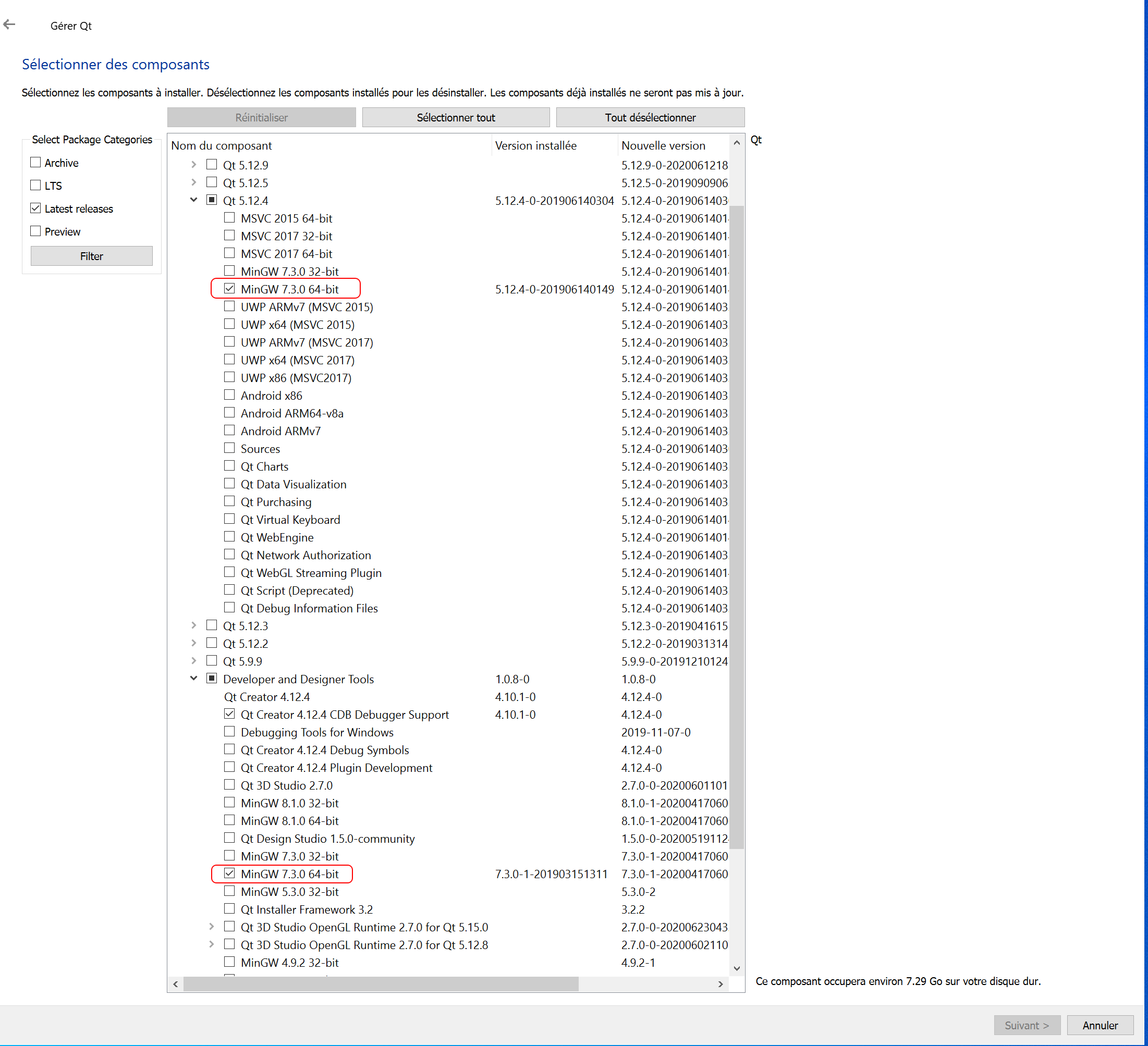

Install cmake (https://cmake.org/install/)
https://github.com/Kitware/CMake/releas … 64-x64.msi
Install CMAKE and chose add PATH for all users
Build ecm
Download cmake-extra-modules (https://github.com/KDE/extra-cmake-modules)
Unpack cmake-extra-modules
SET QTPATH=C:\Qt\5.12.4\mingw73_64cd(path to ecm)
cmake -DCMAKE_INSTALL_PREFIX=%QTPATH% -G "MinGW Makefiles"
mingw32-make install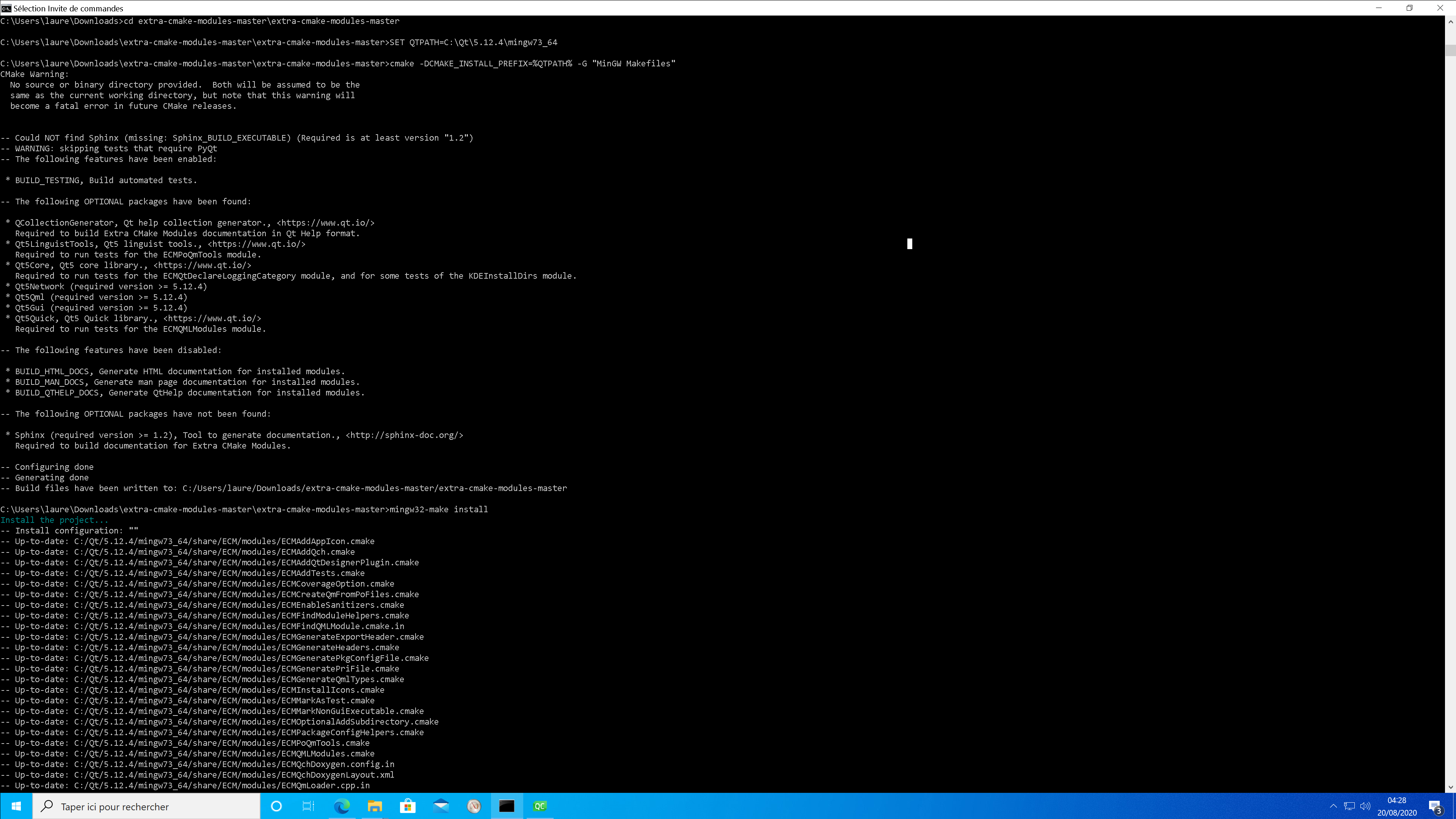
build kcoreaddons
download an unpack tkcoreaddons (https://github.com/KDE/kcoreaddons)
cd (path to kcoreaddons)
mkdir build
cd build
cmake .. -DCMAKE_INSTALL_PREFIX=%QTPATH% -DCMAKE_PREFIX_PATH=$QTPATH -G "MinGW Makefiles" -DZLIB_LIBRARY:FILEPATH=C:\Qt\Tools\mingw730_64\x86_64-w64-mingw32\libz.a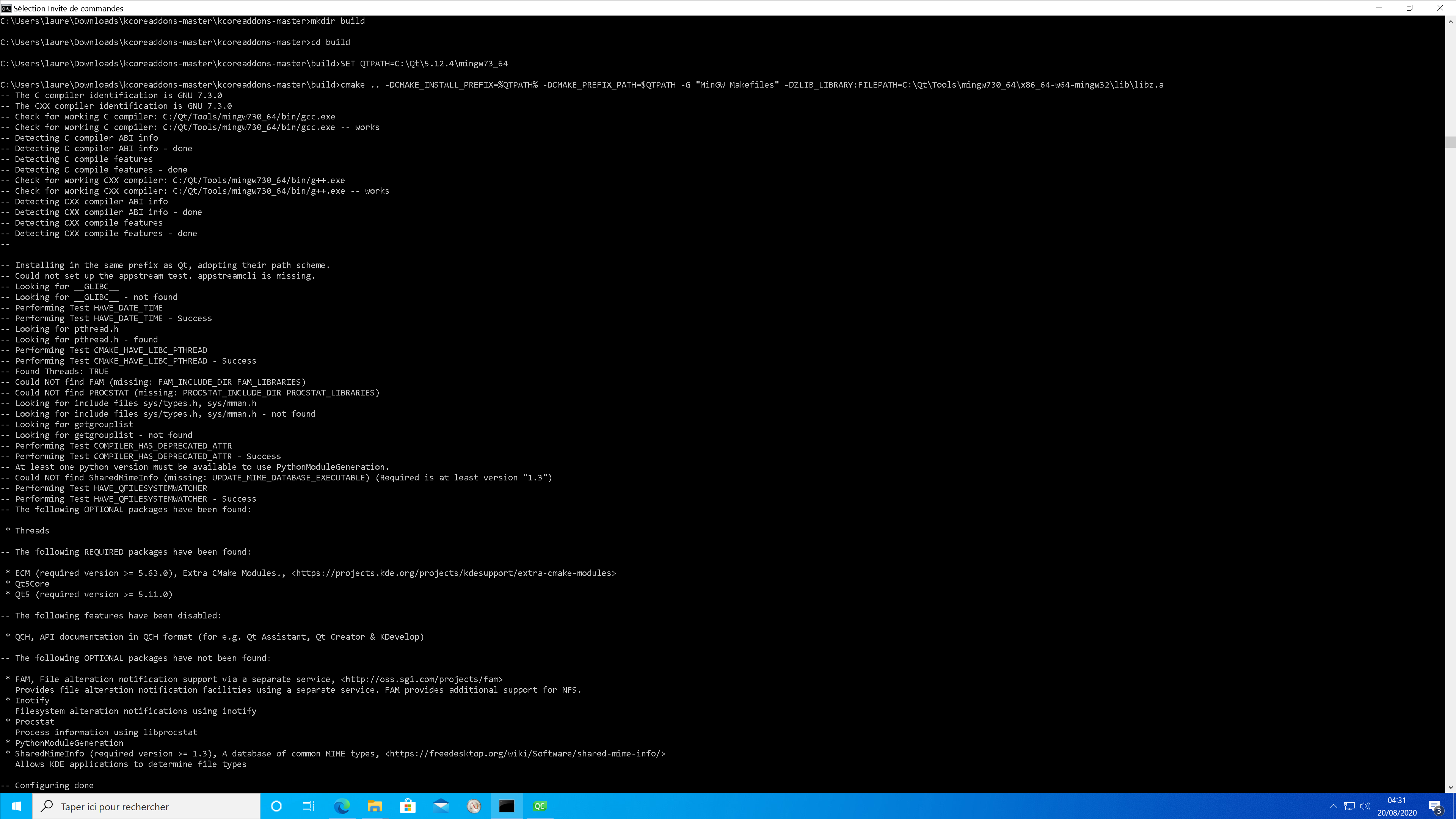
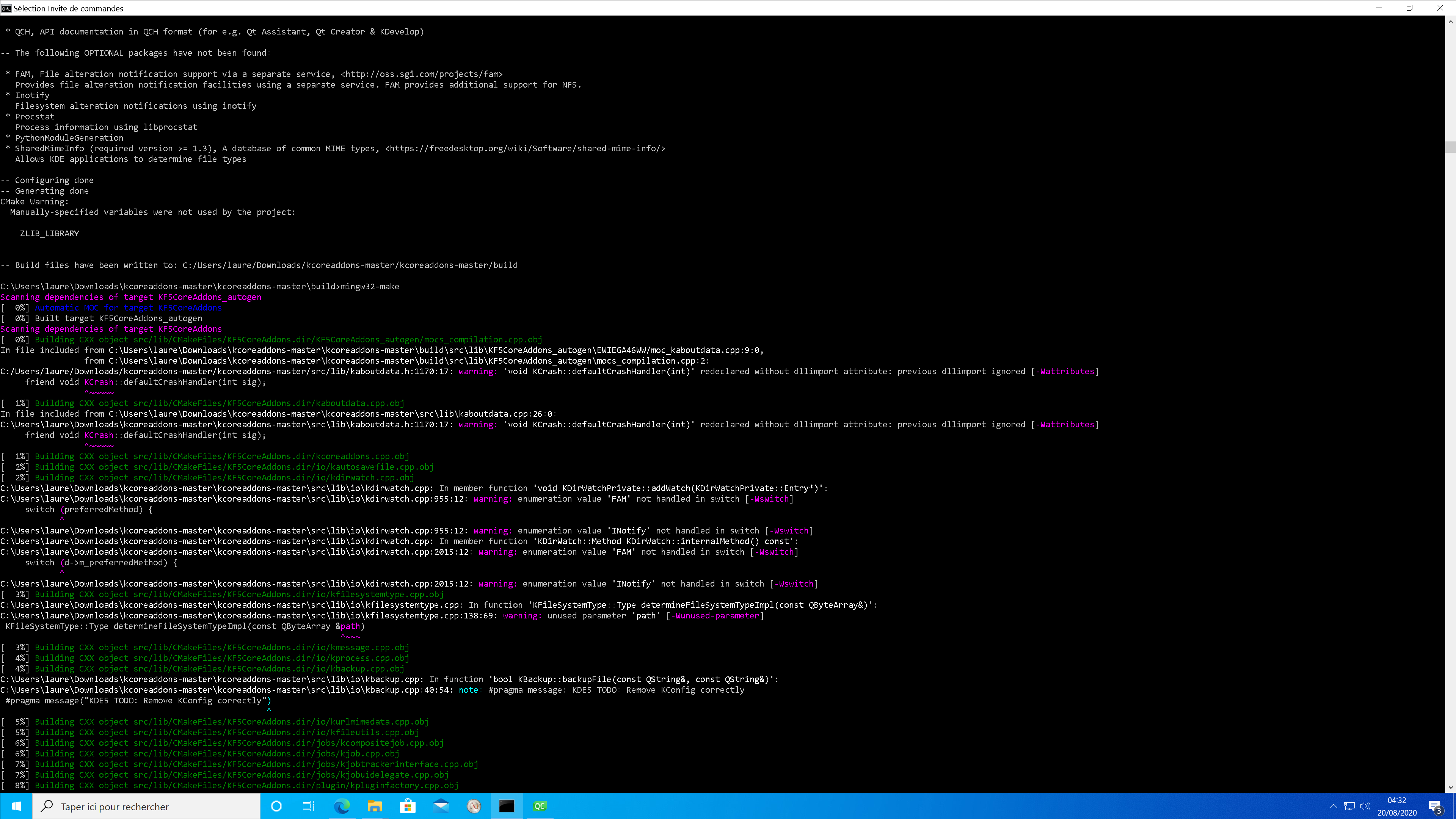
mingw32-make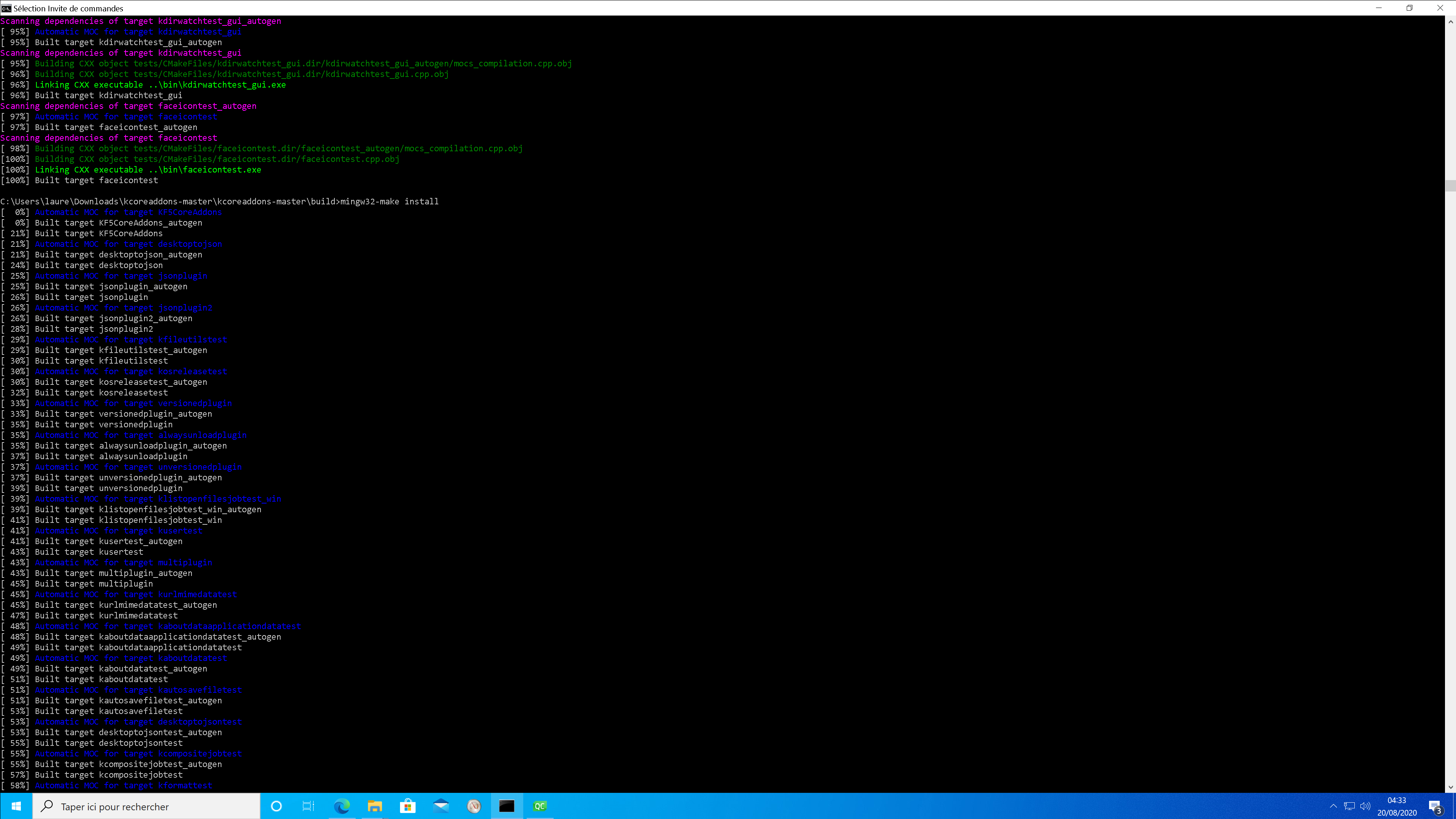
mingw32-make install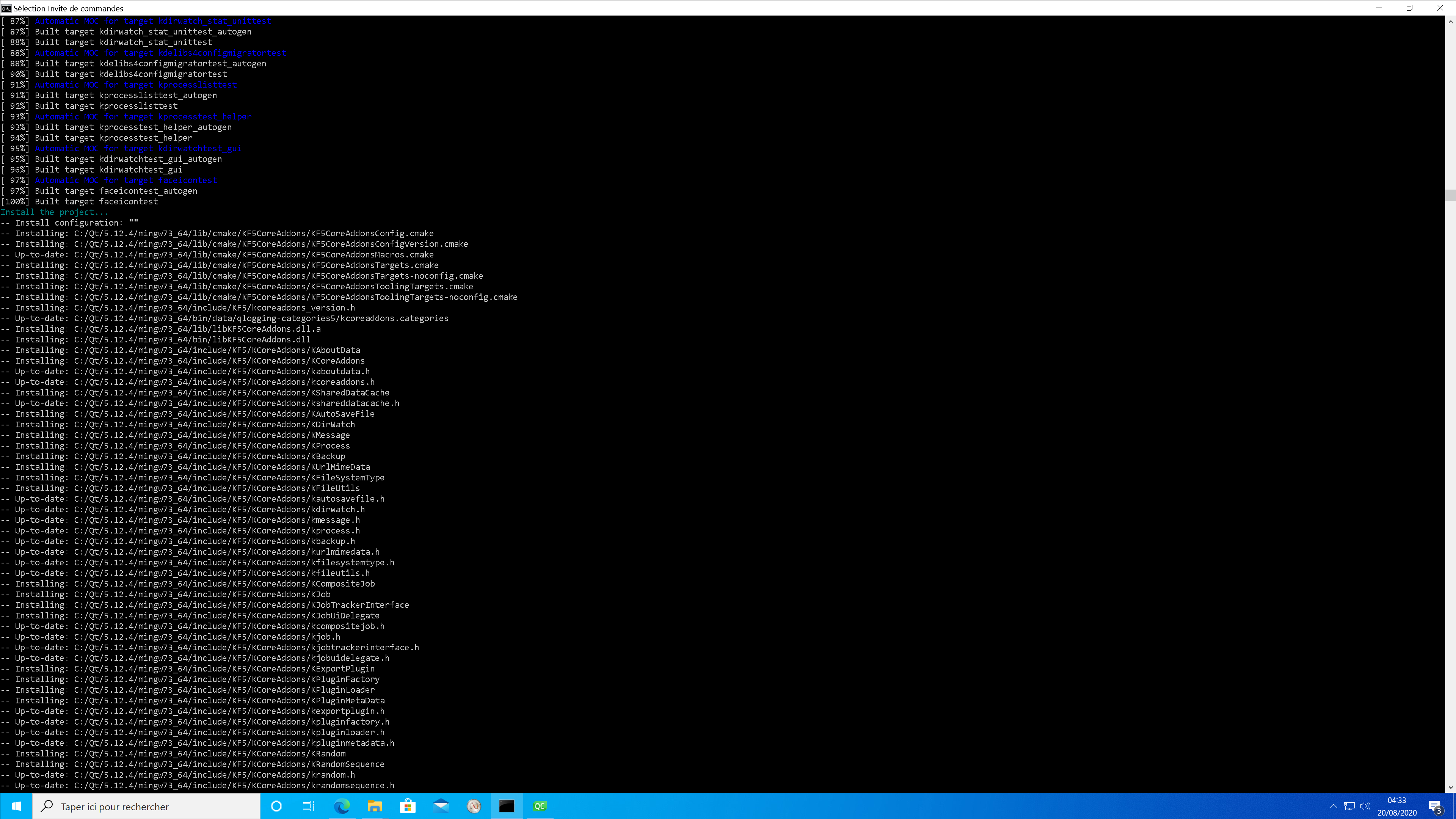
build kwidgetsaddons
downloadan unpack kwidgetsaddons (https://github.com/KDE/kwidgetsaddons)
cd (path to kwidgetsaddons)
mkdir build
cd build
cmake .. -DCMAKE_INSTALL_PREFIX=%QTPATH% -DCMAKE_PREFIX_PATH=$QTPATH -G "MinGW Makefiles" -DZLIB_LIBRARY:FILEPATH=C:\Qt\Tools\mingw730_64\x86_64-w64-mingw32\libz.a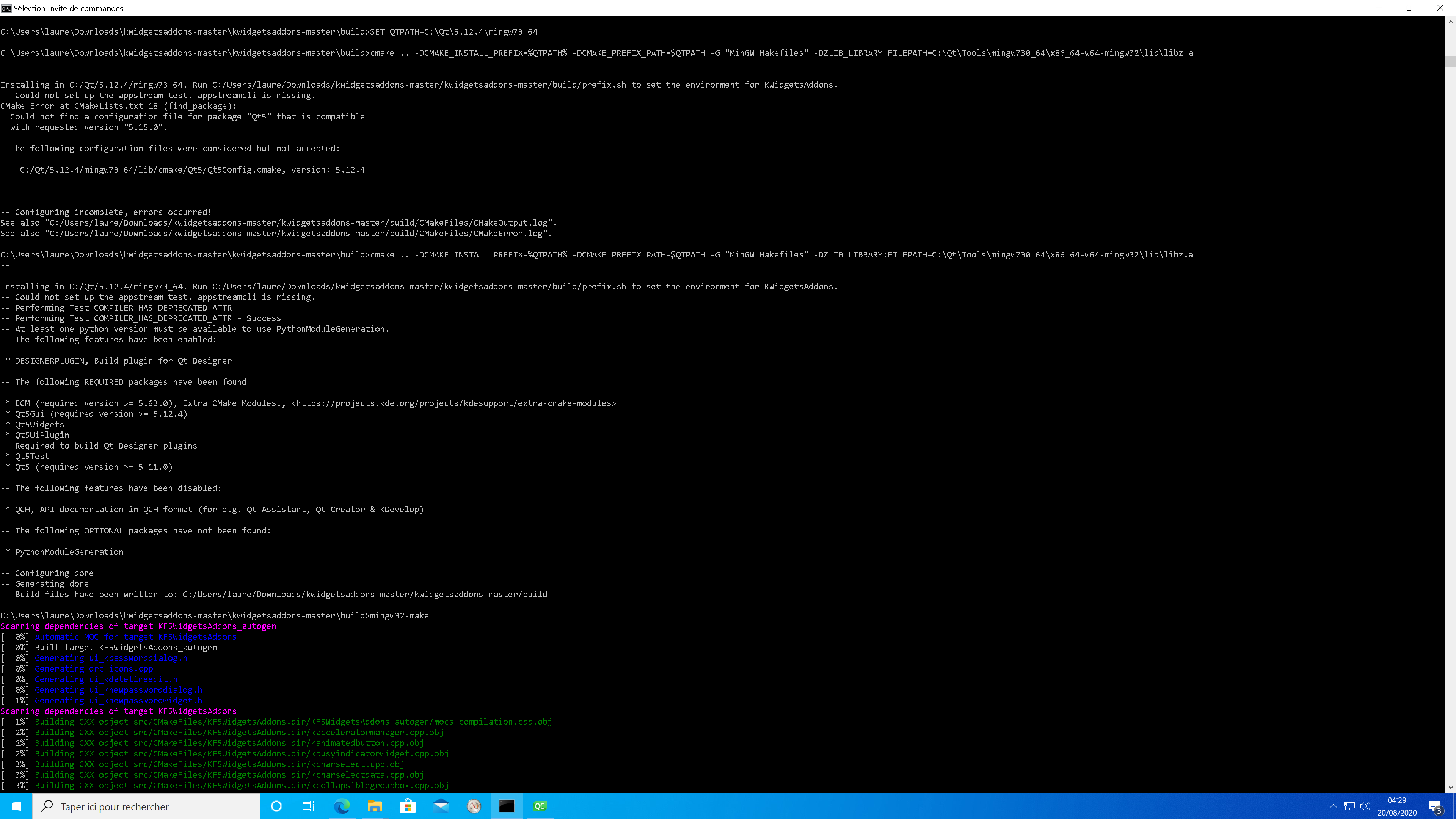
mingw32-make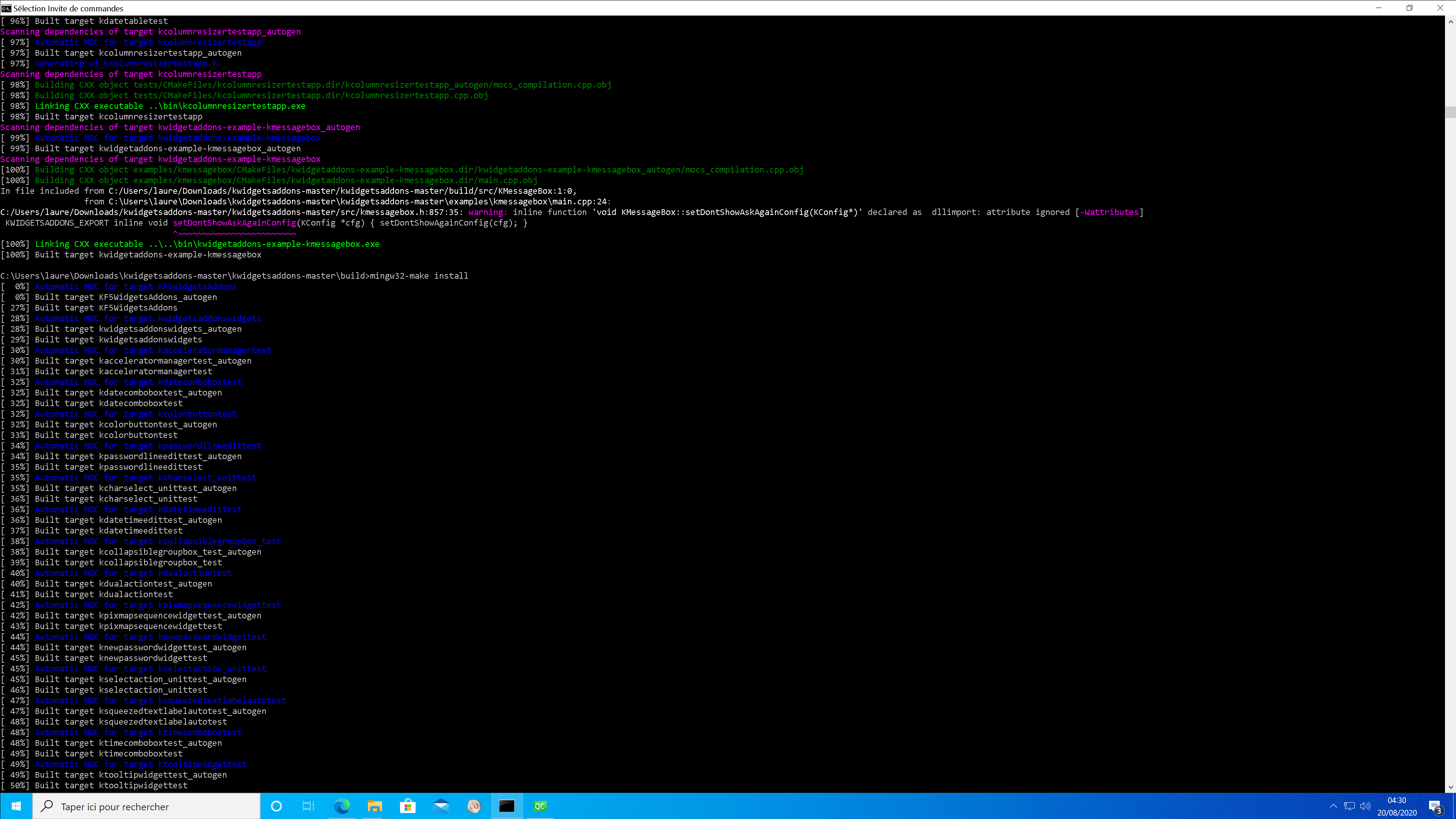
mingw32-make install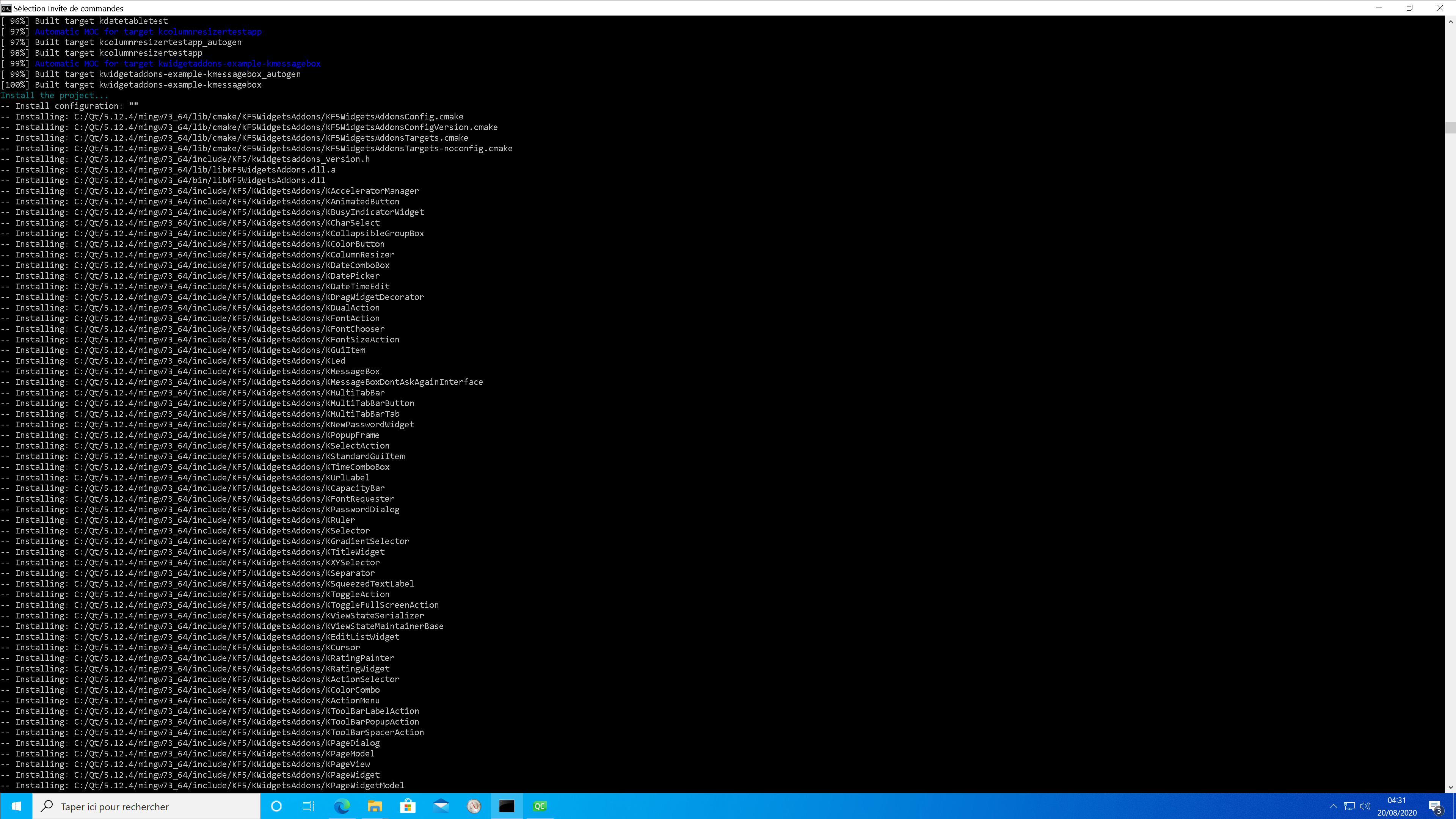
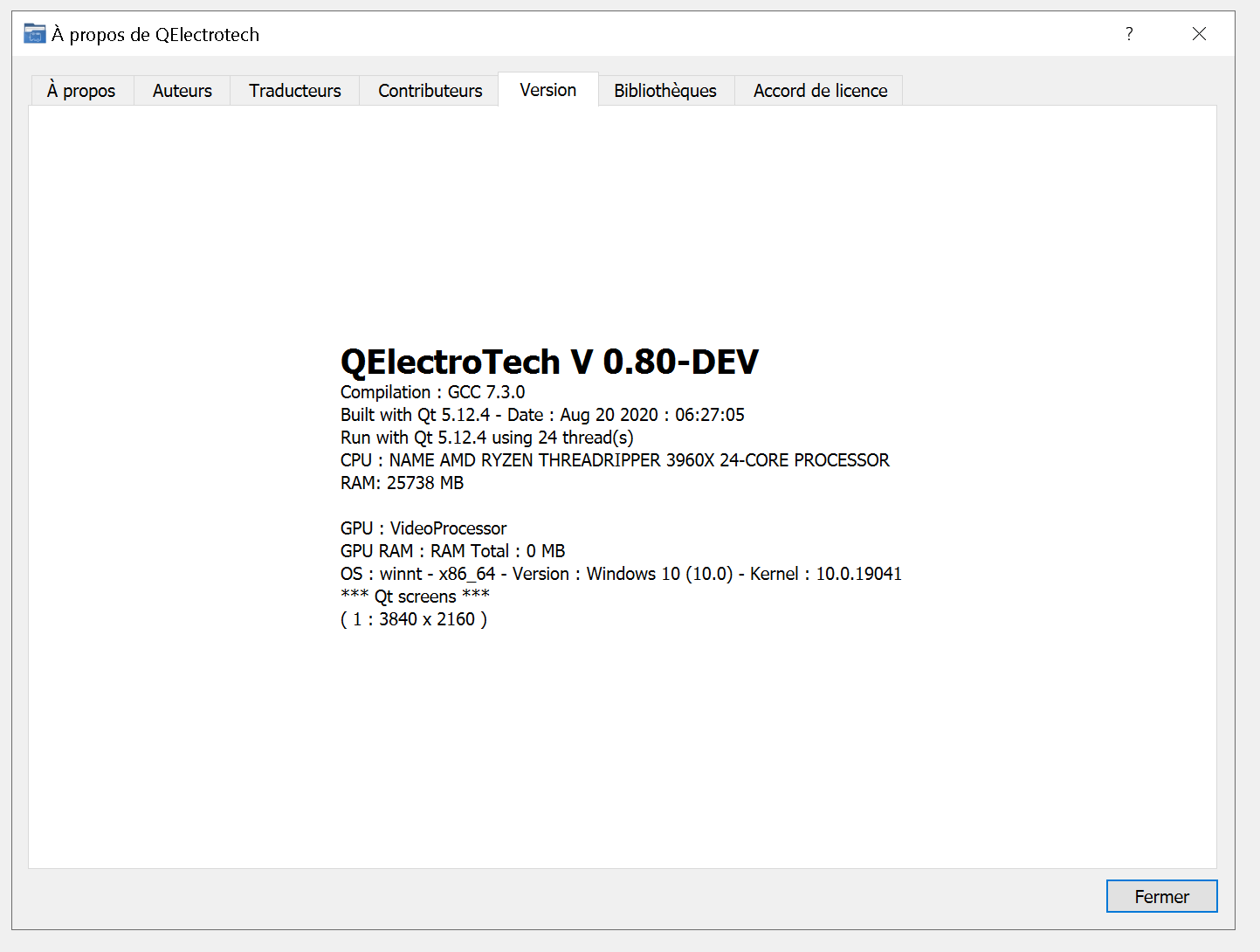
2,932 2020-08-19 22:24:25
Re: bug éditeur d'élements (3 replies, posted in FR : Aide, suggestions, discussions, ...)
Les informations ne sont pas accessibles si on choisis le type slave, ce qui est normal, il me semble.
Pour les autres valeurs type ça fonctionne.
2,933 2020-08-19 21:17:51
Re: bug éditeur d'élements (3 replies, posted in FR : Aide, suggestions, discussions, ...)
Effectivement les informations de l'élément ne sont plus accessibles dans l'éditeur de symboles, merci du retour.
2,934 2020-08-19 19:18:46
Re: Lenteur et plantage sous windows 8.1 (24 replies, posted in FR : Aide, suggestions, discussions, ...)
https://qelectrotech.org/forum/viewtopi … 885#p11885
Un petit test sur ma machine Debian démontre qu'avec 42 000 symboles dans ma collection user en plus des ~ 7000 symboles officiels le temps de lancement est inférieur à 4 secondes.. et de l'ordre de 6 a 7 secondes avec 85 000 elements dans ma collection user .. on a de la marge ... si OS linux et une bonne bécane..
~/.qet/elements$ ./count_elements.sh
42752 elements dans 6038 categories (soit 48790 fichiers)~/.qet/elements$ ./count_elements.sh
85418 elements dans 12068 categories (soit 97486 fichiers)
2,935 2020-08-19 12:19:20
Re: How can i build in Windows QTcreator : KwidgetAddons KcoreAddons (24 replies, posted in Code)
mingw32-make is on C:\Qt\Tools\mingw810_64\bin\
2,936 2020-08-19 10:23:56
Re: Lenteur et plantage sous windows 8.1 (24 replies, posted in FR : Aide, suggestions, discussions, ...)
Alors, j'ai ensuite désinstallé la V0.7 et installé la 0.8 Dev, pas gros changement.
Pas de changement?
Alors certes la 0.8-dev contient ~ 2100 symboles de plus que la 0.7 mais nous avons effectués des changements qui permettent de réduire considérablement le temps de lancement du logiciel.
Certes sous Linux le lancement prendra 1 à 2 secondes là ou sur Windows il en faudra une bonne dizaine..
La 0.8-dev est plus solide que la 0.7 et devrait moins planter sous Windows.
se qelectrotech depuis un moment et j'avais abandonné à l'utiliser, car ça plantait sans arrêt en version (0.5 ou 0.6) avec Windows.
Mais la en version 0.7 ca plante aussi et c'est lent, pour modifier ou créer un élément de la bibliothèque 2 hrs.
Le problème viendrait pas de ton Windows ou du PC, tu as remarqué des problemes similaires avec d'autres logiciels sur cette machine?
2,937 2020-08-18 21:32:01
Re: Lenteur et plantage sous windows 8.1 (24 replies, posted in FR : Aide, suggestions, discussions, ...)
Bonjour,
tu pourrais donner les caractéristiques de ton PC Windows, CPU , RAM, etc?
Tu as essayé la version en cours de devel 0.8-dev?
2,938 2020-08-18 16:43:04
Re: How can i build in Windows QTcreator : KwidgetAddons KcoreAddons (24 replies, posted in Code)
2,939 2020-08-17 12:00:45
Re: Nouveautés de la version de développement 0.8 (317 replies, posted in News)
commit 430ec27f365ee70f2be471c7b75012ba1f3f9c35
Author: David Varley <David.Varley@>
Date: Mon Aug 17 15:38:24 2020 +1000
Fix dxf export of autosize text cells in titleblock
commit 0cb98b2ee1d472c26f0afb04c440db5e9f1cbd91
Author: David Varley <David.Varley@>
Date: Mon Aug 17 09:13:19 2020 +1000
Adjust alignment of titleblock text in DXF export
2,940 2020-08-16 12:03:22
Re: Réduire taille mini ligne folio (11 replies, posted in FR : Aide, suggestions, discussions, ...)
Thanks but it' break row headers..
2,941 2020-08-16 11:58:12
Re: Regroupement conducteurs non souhaité (4 replies, posted in FR : Aide, suggestions, discussions, ...)
mais j'ai lu sur le forum que cette option n'était pas désactivable par défaut.
Il suffit de cliquer sur l'icone dans la barre d'outil pour la désactiver pour la session, un autre clic la ré activera.
https://download.qelectrotech.org/qet/m … r-creation
Tes bornes sur la carte Wago sont dans le même alignement vertical donc tes conducteurs vont se superposer.
2,942 2020-08-16 11:47:39
Re: Inhaltsverzeichnis (3 replies, posted in DE : Hilfe, Vorschläge, Unterhaltungen...)
Hallo
- Log -----------------------------------------------------------------
commit 132f3ad1b41f803a6ca9a78fdc9480196277a5d5
Author: Claveau Joshua <Joshua@>
Date: Tue Jul 14 20:00:28 2020 +0200Remove old summary feature
Old summary page code was removed, and not render your folio list, but now you have new feature to generate summary.
2,943 2020-08-15 15:22:17
Re: Nouveautés de la version de développement 0.8 (317 replies, posted in News)
David fix DXF export for copied conductors, thanks :
- Log -----------------------------------------------------------------
commit ceb2868b0239e5a85c58e869fdd0c334d80f807c
Author: David Varley <David.Varley@>
Date: Sat Aug 15 22:00:14 2020 +1000
Fix dxf export for copied conductors
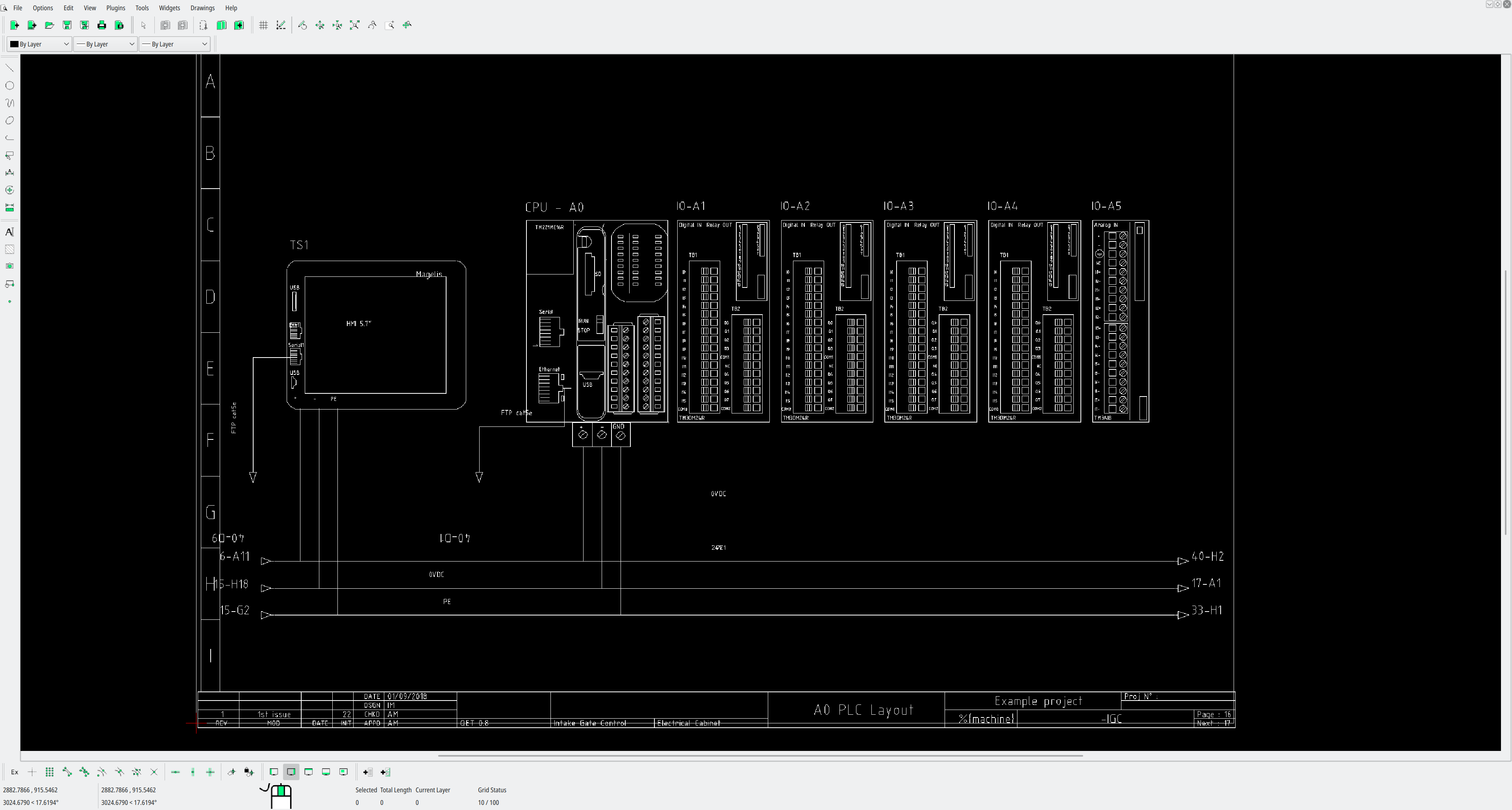
Yuki add Japanese translations, thanks.
- Log -----------------------------------------------------------------
commit 691673670870f535a9977f6b05b3f6830340debf
Merge: fa89178 4c51448
Author: Laurent Trinques <scorpio@>
Date: Sat Aug 15 13:52:01 2020 +0200
Merge branch 'yukia10-l10n_jp' into master
commit 4c51448c45bb04c932afd07824ba15aecbaa9808
Merge: 770161a 295e285
Author: Yuki Atoh <yuki.atoh@>
Date: Sat Aug 15 18:42:16 2020 +0900
Merge branch 'l10n_jp' of https://github.com/yukia10/qelectrotech-source-mirror into l10n_jp
commit 770161ac579f6bbbf3c4d1cfb08626e56f6fd2e1
Author: Yuki Atoh <yuki.atoh@>
Date: Sat Aug 15 14:17:29 2020 +0900
Initial Japanese translation
commit 295e285067c20f124cc34c659776f7da88f9a807
Author: Yuki Atoh <yuki.atoh@>
Date: Sat Aug 15 14:17:29 2020 +0900
Initial Japanese translation
2,944 2020-08-14 22:13:42
Re: Resizing of border line of software (60 replies, posted in Code)
Hum, no change these to "Copyright 2006-2020 The QElectroTech Team"
2,945 2020-08-14 20:35:19
Re: Resizing of border line of software (60 replies, posted in Code)
[19:31:16] laurent@debian:~$ lspci | grep VGA | cut -d : -f 3
Advanced Micro Devices, Inc. [AMD/ATI] Lexa PRO [Radeon 540/540X/550/550X / RX 540X/550/550X] (rev c7)
[20:34:56] laurent@debian:~$
[20:36:15] laurent@debian:~$ lspci -v -s $(lspci | grep VGA | cut -d" " -f 1) | grep " prefetchable"
Memory at d0000000 (64-bit, prefetchable) [size=256M]
Memory at e0000000 (64-bit, prefetchable) [size=2M]
[20:36:40] laurent@debian:~$ Maybe you user isn't in good groups'...or perhapas "system D" fold the cards ...
2,946 2020-08-14 20:08:53
Re: Resizing of border line of software (60 replies, posted in Code)
Well, but we don"t want use ROOT for cli commands..
2,947 2020-08-14 06:11:44
Re: Resizing of border line of software (60 replies, posted in Code)
Hum for Linux only glxinfo match GPU true size memory ..
$ glxinfo | grep 'Video memory'
Video memory: 4096MB
~$ GPU=$(lspci | grep VGA | cut -d ":" -f3);RAM=$(cardid=$(lspci | grep VGA |cut -d " " -f1);lspci -v -s $cardid | grep " prefetchable"| cut -d "=" -f2);
~$ echo $GPU $RAM
Advanced Micro Devices, Inc. [AMD/ATI] Lexa PRO [Radeon 540/540X/550/550X / RX 540X/550/550X] (rev c7) 256M] 2M]
~$ lspci -v -s $(lspci | grep VGA | cut -d" " -f 1) | grep " prefetchable"
Memory at d0000000 (64-bit, prefetchable) [size=256M]
Memory at e0000000 (64-bit, prefetchable) [size=2M]
~$ grep -i mem /var/log/Xorg.0.log
[ 4.674] (--) PCI:*(33@0:0:0) 1002:699f:1da2:e367 rev 199, Mem @ 0xd0000000/268435456, 0xe0000000/2097152, 0xe1e00000/262144, I/O @ 0x00006000/256, BIOS @ 0x????????/131072
[ 4.819] (II) AMDGPU(0): mem size init: gart size :ff86f000 vram size: s:fd72c000 visible:db2c000
vram size: s:fd72c000 = 4252155904
2,948 2020-08-13 17:24:35
Re: Transformation Matrix for Element Editor (15 replies, posted in Code)
2,949 2020-08-13 11:08:28
Re: connection list export (32 replies, posted in EN : Help, suggestions, discussions, ...)
Joshua takes advantage of his vacation to do work on his house.
He doesn't turn on his PC much, from what he told me yesterday.
